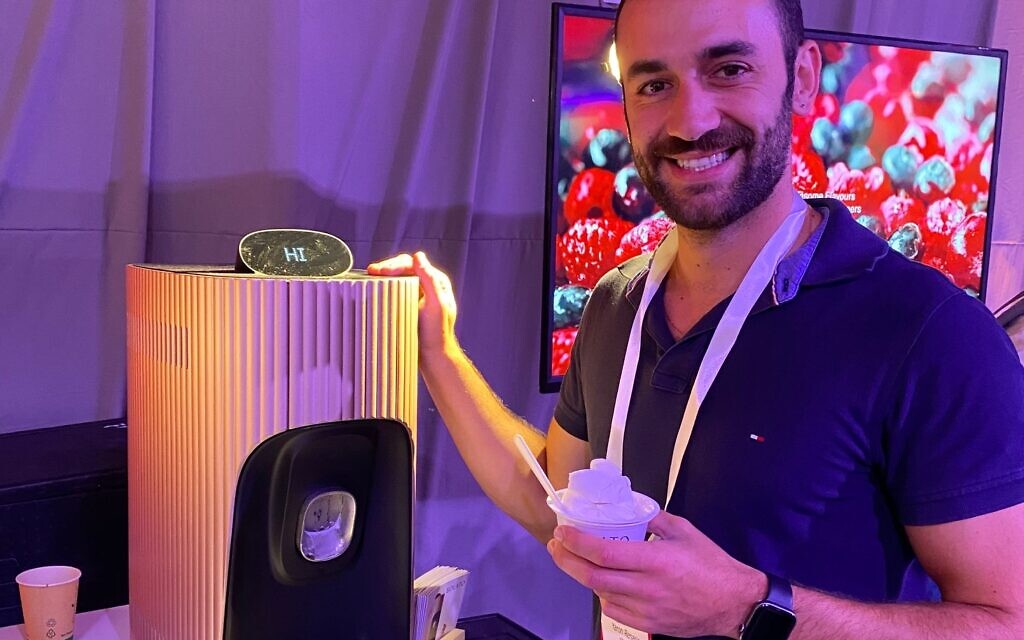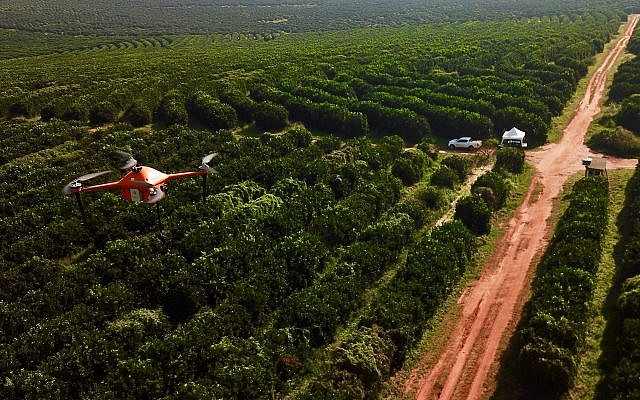In booths of recycled waste, Israel’s fast-growing climate tech sector holds confab
Israel’s first climate innovation event for investors and entrepreneurs hosts range of products and services for sustainable future, including instant ice cream and smart trees

The line to access Israel’s first-ever climate tech conference held in Tel Aviv was long, with people greeting each other, hugging, and chatting in a range of languages that included German and Portuguese along with Hebrew.
“The fact that many people are dressed in jeans and T-shirts means they’re all from the tech industry and they mean business,” noted one attendee at the Wednesday gathering.
As the line inched forward into the exhibition grounds at the Rabin Center, one young man wearing the semi-obligatory uniform of his ilk said, “I’m exhibiting,” and was fast-tracked into the conference space, quipping, “This is like the line at the airport.”
As with travel, the COVID-19 pandemic hasn’t allowed many such gatherings. But the event was also Israel’s very first conference on global climate technology, a growing sector where Israeli technologies are hoping to tackle some of the biggest challenges faced by humanity.
Tomorrow.io, for example, develops weather intelligence software. SeeTree built a tree intelligence network to boost production. Asterra displayed its satellite-based system that can locate and analyze water leaks from underground pipes, and Terra Space Lab (TSL) presented its space-based early detection and monitoring system for environmental events such as wildfires.
The displaying startups were housed in temporary building structures made of materials developed by UBQ, a startup that converts unsorted household waste into a recycled thermoplastic for use in products. The multilayered PVC panels made with UBQ products replaced the oil-based plastics used for conference infrastructure, which have a higher carbon footprint.
“All of these structures were made by us,” said Tato Bigio, the co-CEO and co-founder of the startup, as he proudly pointed to the square structures housed under a tent-like pavilion. “The cleantech sector is gaining ground in Israel, and there is an impressive number of startups on display here today.”
When he founded UBQ, in 2012, he said, there weren’t many other climate tech companies in Israel.

At the fair, foodtech startup Solato offered attendees fresh ice cream made on the spot as they waited. This reporter tasted a delicious nocciola (hazelnut) flavor, produced via capsules like those used by home espresso machines, although bigger in size. The capsules, which contain water, fruit concentrate or nuts, fibers and sugar are inserted into the ice-cream making machine — roughly the size of a small countertop water cooler — which reads their QR code and processes the request. The same polypropylene capsule, now empty of ingredients, is then used to serve the ice cream.
The ice cream-making process consumes 85% less energy than that of normal ice cream as it needs less refrigeration — it is served on the spot — and its carbon footprint is 95% lower, the company says.
Sugar and fat levels are also lower, said food technologist Yaron Renasia, because both act as preservatives in the traditional ice cream manufacturing process, and Solato’s ice cream is made for immediate consumption.
Another Israeli startup, Cellomat, promised a “refurbished smartphone revolution” through its machine that recycles old smartphones.
Catching up on climate tech
Israel, known as the Startup Nation for its prowess in all things tech, from software to cyber technology, artificial intelligence and semiconductors, has lagged behind other nations in climate technologies. That, however, is changing, as policymakers and citizens the world over realize that it is a huge and pressing challenge.
Israeli entrepreneurs are “always attracted” to problems that are considered unsolvable, said Dror Bin, CEO of the Israel Innovation Authority, on the sidelines of the gathering. “They like ‘mission impossible.’”

When that challenge is coupled with huge market demand and money, and the fact that climate relates to all aspects of human life and activity, they are galvanized into action, he explained.
“I’m sure that Israeli entrepreneurs and investors are going to focus on this area,” Bin told The Times of Israel, “and be at the forefront” of these technologies. In addition, climate tech includes a wide range of sectors, including food, smart mobility and energy, offering entrepreneurs the opportunity to flex their brains in the field that most appeals to them.
Israeli startups are already leaders in some clusters, such as precision agriculture, alternative proteins, smart mobility, and novel materials, he said.
“We estimate that it’s going to be a very busy ecosystem here,” he added. “And I use every stage and every interview to call upon entrepreneurs and investors and government agencies and academia to really divert their focus into this area.”

The conference was an initiative of the nonprofit PLANETech — a joint venture of the Israel Institute for Innovation and Consensus Business Group — and was held in partnership with the Israel Innovation Authority. More than 1,500 participants from Israel were expected along with 100 climate tech startups and ventures that presented their technologies, according to a statement by the organizers before the event.
In addition, the event drew five of the world’s top 10 climate tech-focused investors including Energy Impact Partners, Plug and Play Ventures, and ENGIE New Ventures.
One of the main goals of the conference was to promote discourse, raise awareness and showcase the most innovative and creative solutions the Israeli tech industry has to offer, according to organizers.
Ilana Trombka, the director-general of the Federal Senate of Brazil, said she had come to share experiences about gender equality and innovative solutions with Israel. “There is a huge number of startups here, all of them thinking about the climate challenge,” along with the people who need solutions, she said. “If all of them are in one place, it is easier to solve problems.”

According to PLANETech, there are 694 climate tech startups in Israel operating in a variety of sectors including energy, mobility, agriculture, food, circular economy, and water.
One out of every seven startups set up in 2021 was in the climate tech field, PLANETech said in its latest report, accounting for 14% of the total number of startups in Israel and up from 9% the previous year.
According to figures provided by the Israel Innovation Authority, investments in Israeli climate technology ventures in the first half of 2022 reached almost $1.5 billion. In the full year 2021, the figure was close to $2.5 billion, up from just over $1.5 billion in 2020.
The figures are still minor compared to the huge amounts invested in other tech sectors in Israel, though. Total investment in the Israeli tech sector reached a whopping $25.6 billion in 2021. But the trend is upward.
“We are just warming up,” said the Innovation Authority’s Bin. According to the PLANETech report, investments in climate-tech companies in Israel from 2018 to 2021 increased by 340%, 2.6 times faster than global investments in the sector.
Joern-Carlos Kuntze, a co-founder and partner at Extantia Capital, a German-based venture capital fund that invests in climate technologies and has 300 million euros in assets ($295 million), was having a drink with Oliver Schwarzer, the fund’s CFO and partner. Almost the company’s whole team of some 12 people was attending the event in Tel Aviv, he said.
Extantia has made investments of just below €10 million ($9.9 million) in each of three Israeli startups as part of its newly launched fund, he said. One of the investments is in H2Pro, a Caesarea-based company that seeks to make low-cost hydrogen in large quantities, which also got funding from Microsoft founder Bill Gates. Though Kuntze declined to reveal the names of the other two Israeli startups in which Extantia has invested, he said they operate in the thermal energy and direct air capture sectors.

Israeli companies account for one-fourth of Extantia’s global investment portfolio of 12 startups, he said, and the VC fund has a representative in Israel scouting for more.
“Israel ignored the sector for a while, probably waiting to see what others were doing in the sector,” said Kuntze. “But now they see that Europe is pushing hard in the field and they realize that energy dependence is a problem, and that this is a threat that both hits and unites us all.”
“The fact that we are here with our entire team shows our commitment to the region and we think there is good potential here,” he told The Times of Israel.
Authorities and politicians need to make sure that startups can implement and pilot their technologies locally and must remove all obstacles to the development of these innovations, he added.
“There is a lot of knowledge here and climate can be a pillar for the Israeli economy — and Israel can be a leader in climate tech.”
There's no paywall on The Times of Israel, but the journalism we do is costly. As an independent news organization, we are in no way influenced by political or business interests. We rely on readers like you to support our fact-based coverage of Israel and the Jewish world. If you appreciate the integrity of this type of journalism, please join the ToI Community.

We’re really pleased that you’ve read X Times of Israel articles in the past month.
That’s why we started the Times of Israel eleven years ago - to provide discerning readers like you with must-read coverage of Israel and the Jewish world.
So now we have a request. Unlike other news outlets, we haven’t put up a paywall. But as the journalism we do is costly, we invite readers for whom The Times of Israel has become important to help support our work by joining The Times of Israel Community.
For as little as $6 a month you can help support our quality journalism while enjoying The Times of Israel AD-FREE, as well as accessing exclusive content available only to Times of Israel Community members.
Thank you,
David Horovitz, Founding Editor of The Times of Israel









